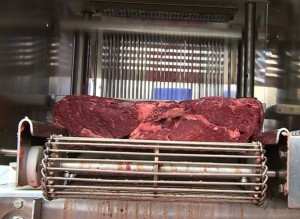Labels are a lousy information vehicle; but they’re a start.
According the this report from CBS, needle or mechanical tenderizing is where cuts of meat is pierced with needles or sliced with blades to break down collagen and make it taste better. But the meat could make you sick if not cooked properly.
 Brian Buckley, who works for the Institute of Culinary Education, said the process drives surface contaminants, including potentially lethal E. coli, deeper into the meat so cooking is less likely to kill them.
Brian Buckley, who works for the Institute of Culinary Education, said the process drives surface contaminants, including potentially lethal E. coli, deeper into the meat so cooking is less likely to kill them.
“If you don’t cook the meat thoroughly to 160 degrees all the way through, you could expose people who east more medium to medium rare to E. coli,” he explained.
The problem is there’s no way to know if the meat you’re buying is tenderized. There are no labels to alert consumers.
Between 2000 and 2009 there were five documented outbreaks of E. coli linked to mechanically tenderized beef, leaving 174 people sick, and one dead.
Starting in 2016, tenderized beef in the U.S. will have to be labeled as such, along with cooking instructions. Labels are already required in Canada.
About 25 percent of beef sold in stores is tenderized.
